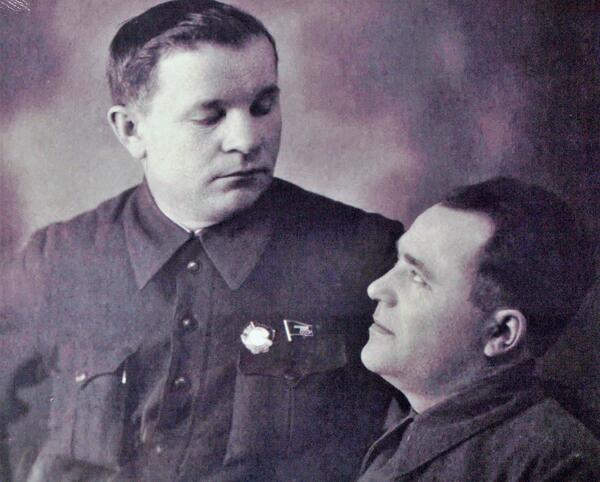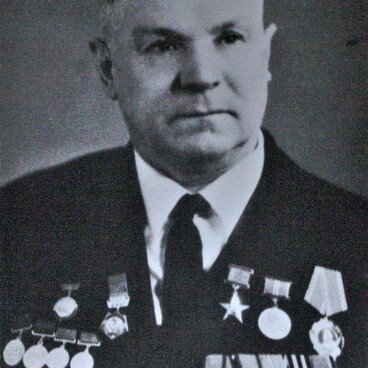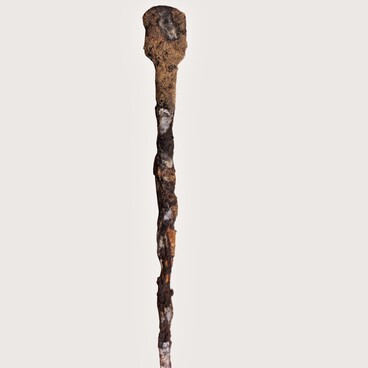The collection of the Shebekino History and Art Museum contains a photo of two colleagues, Shebekino deputies of the Supreme Soviet of the USSR. They helped to develop the region: they initiated the construction of new facilities and even suggested reorganizing Shebekino from a village into a city. Nicanor Serikov is pictured on the left and Ivan Belavin is pictured sitting on the right.
Nicanor Serikov was born in 1896 in the village of Novaya Tavolzhanka into a peasant family. He graduated from the local parochial school and worked at the Novotavolzhansky sugar factory from a young age. Firstly, he was a foreman and later, the head of the collective farm “Day of Harvest”. In 1935, he was awarded the Order of Lenin and put in charge of the backward farm “Veselye Zhyttya” in the village of Malomikhailovka, the Shebekino district.
In 1937, Serikov was elected deputy of the Supreme Soviet of the USSR, and in 1938, a chairman of the Shebekino District Executive Committee. At the second session of the Congress of Soviets in Moscow, he suggested reorganizing the worker’s settlement of Shebekino into a city. For that purpose, it was necessary to expand the industrial infrastructure following the requirements for cities. The Polyanskaya machine and tractor station, the “Indposhiv” workshop, and the technical station were built in Shebekino under Serikov’s leadership. By the decree of the Presidium of the Supreme Soviet of the RSFSR of December 16, 1938, Shebekino workers’ settlement obtained the city status.
Ivan Belavin, the first secretary of the Shebekino District Committee of the All-Union Communist Party (bolsheviks), worked together with Serikov. He was born in 1902 in Safronovka village of the Kursk governorate into a peasant family. Since 1914, he was engaged in hard labor: he worked as a hammerman at an iron foundry, as a carpenter, and laborer. After graduating from the agricultural technical school, Belavin held senior positions in the sugar beet farms of the Kursk region.
In 1935, Ivan Belavin was appointed the head of the plant-breeding station division of the Lgovskiy district. Two years later, he was elected a deputy of the Supreme Soviet of the USSR, as well as Serikov. In 1941, he was elected the first secretary of the Shebekino District Committee of the All-Union Communist Party (bolsheviks). In the first months after the outbreak of the Great Patriotic War, Belavin managed the evacuation of industrial enterprises, collective farm cattle, and adjusted ration supplies for the Red Army.
After the liberation of Shebekino in 1943, Belavin was responsible for the economic recovery since it was necessary to restore the destroyed factories, schools and apartment buildings, as well as collective farm fields full of mines and unexploded shells. The war and hard work undermined Belavin’s health, and he passed away in 1947.
Nicanor Serikov was born in 1896 in the village of Novaya Tavolzhanka into a peasant family. He graduated from the local parochial school and worked at the Novotavolzhansky sugar factory from a young age. Firstly, he was a foreman and later, the head of the collective farm “Day of Harvest”. In 1935, he was awarded the Order of Lenin and put in charge of the backward farm “Veselye Zhyttya” in the village of Malomikhailovka, the Shebekino district.
In 1937, Serikov was elected deputy of the Supreme Soviet of the USSR, and in 1938, a chairman of the Shebekino District Executive Committee. At the second session of the Congress of Soviets in Moscow, he suggested reorganizing the worker’s settlement of Shebekino into a city. For that purpose, it was necessary to expand the industrial infrastructure following the requirements for cities. The Polyanskaya machine and tractor station, the “Indposhiv” workshop, and the technical station were built in Shebekino under Serikov’s leadership. By the decree of the Presidium of the Supreme Soviet of the RSFSR of December 16, 1938, Shebekino workers’ settlement obtained the city status.
Ivan Belavin, the first secretary of the Shebekino District Committee of the All-Union Communist Party (bolsheviks), worked together with Serikov. He was born in 1902 in Safronovka village of the Kursk governorate into a peasant family. Since 1914, he was engaged in hard labor: he worked as a hammerman at an iron foundry, as a carpenter, and laborer. After graduating from the agricultural technical school, Belavin held senior positions in the sugar beet farms of the Kursk region.
In 1935, Ivan Belavin was appointed the head of the plant-breeding station division of the Lgovskiy district. Two years later, he was elected a deputy of the Supreme Soviet of the USSR, as well as Serikov. In 1941, he was elected the first secretary of the Shebekino District Committee of the All-Union Communist Party (bolsheviks). In the first months after the outbreak of the Great Patriotic War, Belavin managed the evacuation of industrial enterprises, collective farm cattle, and adjusted ration supplies for the Red Army.
After the liberation of Shebekino in 1943, Belavin was responsible for the economic recovery since it was necessary to restore the destroyed factories, schools and apartment buildings, as well as collective farm fields full of mines and unexploded shells. The war and hard work undermined Belavin’s health, and he passed away in 1947.



